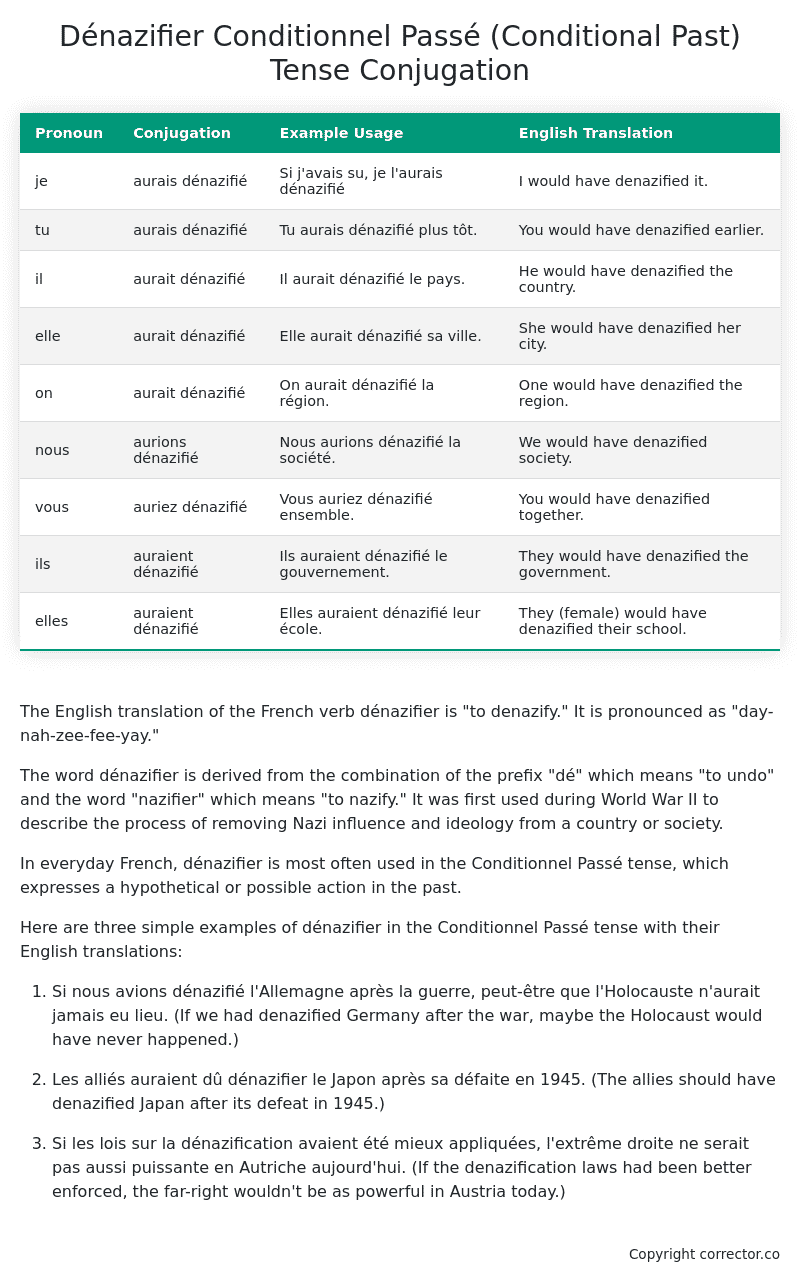Conditionnel Passé (Conditional Past) Tense Conjugation of the French Verb dénazifier
Introduction to the verb dénazifier
The English translation of the French verb dénazifier is “to denazify.” It is pronounced as “day-nah-zee-fee-yay.”
The word dénazifier is derived from the combination of the prefix “dé” which means “to undo” and the word “nazifier” which means “to nazify.” It was first used during World War II to describe the process of removing Nazi influence and ideology from a country or society.
In everyday French, dénazifier is most often used in the Conditionnel Passé tense, which expresses a hypothetical or possible action in the past.
Here are three simple examples of dénazifier in the Conditionnel Passé tense with their English translations:
-
Si nous avions dénazifié l’Allemagne après la guerre, peut-être que l’Holocauste n’aurait jamais eu lieu. (If we had denazified Germany after the war, maybe the Holocaust would have never happened.)
-
Les alliés auraient dû dénazifier le Japon après sa défaite en 1945. (The allies should have denazified Japan after its defeat in 1945.)
-
Si les lois sur la dénazification avaient été mieux appliquées, l’extrême droite ne serait pas aussi puissante en Autriche aujourd’hui. (If the denazification laws had been better enforced, the far-right wouldn’t be as powerful in Austria today.)
Table of the Conditionnel Passé (Conditional Past) Tense Conjugation of dénazifier
| Pronoun | Conjugation | Example Usage | English Translation |
|---|---|---|---|
| je | aurais dénazifié | Si j’avais su, je l’aurais dénazifié | I would have denazified it. |
| tu | aurais dénazifié | Tu aurais dénazifié plus tôt. | You would have denazified earlier. |
| il | aurait dénazifié | Il aurait dénazifié le pays. | He would have denazified the country. |
| elle | aurait dénazifié | Elle aurait dénazifié sa ville. | She would have denazified her city. |
| on | aurait dénazifié | On aurait dénazifié la région. | One would have denazified the region. |
| nous | aurions dénazifié | Nous aurions dénazifié la société. | We would have denazified society. |
| vous | auriez dénazifié | Vous auriez dénazifié ensemble. | You would have denazified together. |
| ils | auraient dénazifié | Ils auraient dénazifié le gouvernement. | They would have denazified the government. |
| elles | auraient dénazifié | Elles auraient dénazifié leur école. | They (female) would have denazified their school. |
Other Conjugations for Dénazifier.
Le Present (Present Tense) Conjugation of the French Verb dénazifier
Imparfait (Imperfect) Tense Conjugation of the French Verb dénazifier
Passé Simple (Simple Past) Tense Conjugation of the French Verb dénazifier
Passé Composé (Present Perfect) Tense Conjugation of the French Verb dénazifier
Futur Simple (Simple Future) Tense Conjugation of the French Verb dénazifier
Futur Proche (Near Future) Tense Conjugation of the French Verb dénazifier
Plus-que-parfait (Pluperfect) Tense Conjugation of the French Verb dénazifier
Passé Antérieur (Past Anterior) Tense Conjugation of the French Verb dénazifier
Futur Antérieur (Future Anterior) Tense Conjugation of the French Verb dénazifier
Subjonctif Présent (Subjunctive Present) Tense Conjugation of the French Verb dénazifier
Subjonctif Passé (Subjunctive Past) Tense Conjugation of the French Verb dénazifier
Subjonctif Imparfait (Subjunctive Imperfect) Tense Conjugation of the French Verb dénazifier
Subjonctif Plus-que-parfait (Subjunctive Pluperfect) Tense Conjugation of the French Verb dénazifier
Conditionnel Présent (Conditional Present) Tense Conjugation of the French Verb dénazifier
Conditionnel Passé (Conditional Past) Tense Conjugation of the French Verb dénazifier (this article)
L’impératif Présent (Imperative Present) Tense Conjugation of the French Verb dénazifier
L’infinitif Présent (Infinitive Present) Tense Conjugation of the French Verb dénazifier
Struggling with French verbs or the language in general? Why not use our free French Grammar Checker – no registration required!
Get a FREE Download Study Sheet of this Conjugation 🔥
Simply right click the image below, click “save image” and get your free reference for the dénazifier Conditionnel Passé tense conjugation!

Dénazifier – About the French Conditionnel Passé (Conditional Past) Tense
Formation
Common Everyday Usage Patterns
Expressing Unreal Past Scenarios
Polite Requests or Suggestions
Expressing Doubt or Uncertainty
Interactions with Other Tenses
Conditional Present
Indicative Past Tenses
Conditional Future
Summary
Want More?
I hope you enjoyed this article on the verb dénazifier. Still in a learning mood? Check out another TOTALLY random French verb conjugation!


